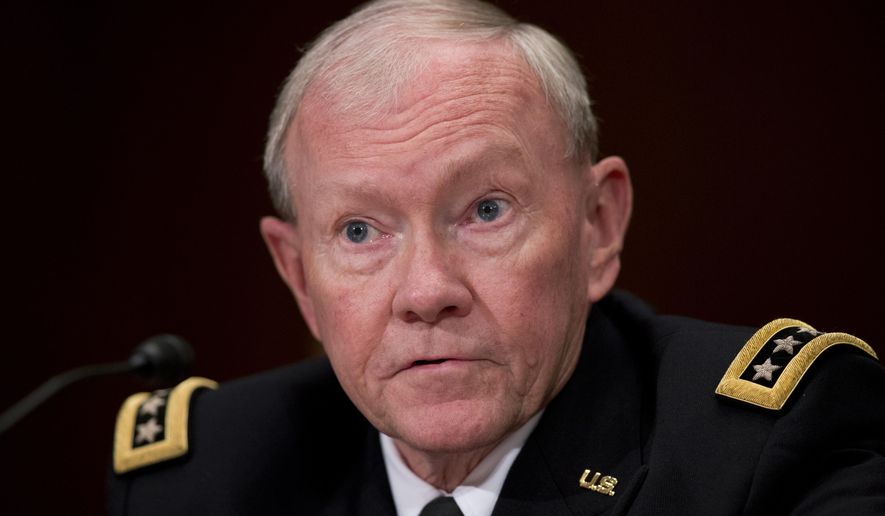NAPLES, Italy (AP) — The new U.S. military hub setting up in Iraq’s western desert could be a model for more such train-and-advise operations — and with it likely more U.S. troops — designed to help Iraq defeat the Islamic State, the top-ranking American general said Thursday.
“Sure, we’re looking all the time at whether there might be additional sites necessary,” Gen. Martin Dempsey, chairman of the Joint Chiefs of Staff, told reporters traveling with him to Naples, Italy, where he is meeting with U.S. commanders.
“It’s another one of the options” short of committing U.S. ground combat forces, he said. President Barack Obama has ruled out U.S. ground combat.
Dempsey spoke the day after the Obama administration announced that as many as 450 U.S. troops will go over the next two months to al-Taqqadum, situated between the Islamic State-occupied cities of Ramadi and Fallujah in Anbar province, to advise Iraqi forces and help integrate a larger number of Sunni tribal fighters into the Iraqi campaign to retake Ramadi.
Dempsey said the mission for U.S. forces there “first and foremost” will be to assist the Iraqi military in organizing and executing its counteroffensive, while encouraging greater Sunni involvement. Integrating into the fight the Sunni tribes — who have either been sidelined by the Shiite-led central government in Baghdad or unwilling to join — is seen as a crucial to driving the Islamic State out of the Sunni-majority areas of western Iraq.
As the Iraqi campaign against the Islamic State progresses, Dempsey said, another such U.S. hub could be established along the route between Baghdad and the northern city of Mosul, which has been under Islamic State control for a year. Prospects for launching a counteroffensive in Mosul this year, however, seem dim, given the Iraqi army’s recent defeat in Ramadi.
Dempsey refused to offer a timeline for Iraq launching a counteroffensive in Ramadi, but his description of the plan for al-Taqqadum indicated the big counter-attack is not imminent.
“It will take several weeks” for the U.S. to establish its base at al-Taqqadum, he said. It will include not only U.S. military advisers but also personnel to provide basic supplies and to protect the base. He said almost half of the 450 troops will be devoted to the “force protection” mission.
Asked about the reason for putting U.S. advisers closer to the fight for Ramadi, he said, “I think that this will be an enabler to what eventually will become a counterattack to reclaim Ramadi.”
Wednesday’s announcement left out any move to send U.S. forces closer to the front lines, either to call in airstrikes or to advise smaller battlefront units, underscoring Obama’s reluctance to plunge the military deeper into war and risk the sight of more body bags coming home from Iraq.
The U.S. is insistent that the Americans will not have a combat role but said they may venture out of the base in order to help identify and recruit Sunni tribes.
“Is this a game changer? … No. It’s an extension of an existing campaign that makes the campaign more credible. The game changers are going to have to come from the Iraqi government,” Dempsey told reporters traveling with him.
The expanded effort also will include expediting the delivery of U.S. equipment and arms to Iraq, including directly to troops at al-Taqaddum, under the authority of the government in Baghdad.
Obama this week lamented that the U.S. lacks a “complete strategy” for defeating the Islamic State, and officials pointed to a glaring lack of recruits among Sunnis.
The Sunni-Shiite divide has been at the heart of the Islamic State’s successes in Iraq. Officials blamed the Iraqi government for last year’s collapse of the military in the face of the Islamic State onslaught. Many Sunnis in the armed forces dropped their weapons and fled, unwilling to fight for the Shiite-led government.
Some local citizens in Sunni-majority areas still fear an invasion and reprisals from Iran-backed Shiite militia even more than domination by the Islamic State. And Iraqi leaders in the Shiite-led government have been slow to recruit Sunni tribesmen, fearing that the fighters, once armed, could turn against them.
New Iraqi Prime Minister Haider al-Abadi has promised to address those concerns.
Obama’s new plan, however, doesn’t go far enough for critics who have pressed for military coordinators and advisers closer to the front lines to augment the U.S. airstrike campaign.
House Speaker John Boehner, R-Ohio, said Wednesday that sending several hundred military advisers to Iraq “is a step in the right direction,” but he criticized Obama for not having “an overarching strategy.” Sen. John McCain of Arizona, the Republican chairman of the Senate Armed Services Committee, was harsher in his assessment: “This is incrementalism at its best or worst, depending on how you describe it.”
And some Democrats were also concerned. “Absent significant reform, we can help the Iraqi forces win battles, but they will not stay won,” said Rep. Adam Schiff of California, the House Intelligence Committee’s top Democrat.
There now are nearly 3,100 U.S. troops in Iraq involved in training, advising, security and other support. In addition to bombing missions, the U.S. is conducting aerial reconnaissance and intelligence-gathering missions against Islamic State forces, while counting on Iraqi troops to do the fighting on the ground.
___
Baldor reported from Washington. Associated Press writers Jim Kuhnhenn, Deb Riechmann and Nedra Pickler in Washington contributed to this article.




Please read our comment policy before commenting.